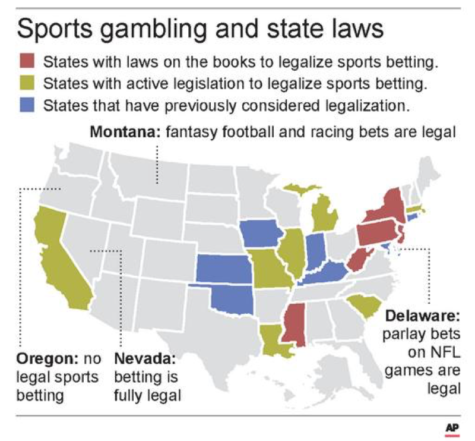Editorial: Problems with sports gambling could arise with Supreme Court ruling
May 30, 2018
Get ready, addicts, casinos are partnering with America’s favorite pastimes.
On Monday, May 14, the Supreme Court struck down a federal law that prohibits sports betting. The Professional and Amateur Sports Protection Act (PASPA) of 1992, the law that banned state-authorized betting, was ruled unconstitutional in a 6-3 vote. States that would like to offer legal sports betting are now allowed to do so, and many of the eastern states like New Jersey, Delaware, West Virginia, and more are already planning on jumping into the legal sports betting business. Even our very own state of Pennsylvania is working to legalize sports betting. Ultimately, both the MLB and NBA said that the integrity and protection of the sport remains as the highest priority.

With the Supreme Court giving states the ability to make sports betting legal, it makes games more about money, and less about just enjoying it as it should be. That is bad.
A course of action that the NBA tried to take was proposing a 1% “integrity fee,” which gives the NBA 1% of each wager placed on NBA games or events. This idea was presented back in January of 2018 and most likely will not happen. It would have potentially amounted to 20%-29% of total revenue made by certain operations, which many argue that it is a way to just skim money from American taxpayers, but I think it’s a reasonable price to pay for the integrity of the sport.
Clearly New Jersey doesn’t care about the integrity issue at hand.
If it were up to the MLB and NBA, they wouldn’t allow sports betting, so since the decision is out of their hands, why not give them a little something so that everyone’s happy about something?
The American Gaming Association estimates that Americans already illegally wager about $150 billion on sports each year, according to Time.
If 1% of each bet goes to the organizations, it shouldn’t matter too much for the gamblers themselves considering the mass amount of money Americans bet yearly. Also taking into account that the 1% would go towards bet monitoring, investigations and education, it would only benefit major league sports.
Without the integrity fee in place, however, the leagues cannot monitor data as safely and could find people winning bets or wagers more often, which would be an upset to many and cause professional sports to up their integrity protocols, which would end up taking more money from the sports organizations themselves.
Even with the integrity fee in place, which most likely will not happen, no amount of money can be paid to keep the integrity of a sport. The purpose of the games, for specktators to the athletes themselves, will forever be changed. People are going to start to care more about the money they could win from betting rather than simply enjoying the games as they’re meant to be.
The only things that can really be done is to contact the heads of states, voice to them the issues on making sports betting legal, and pray. Or you could contact National Public Radio (NPR) and join their discussion on the issue in hopes that the word spreads. You can call in or email them at talk@npr.org. There isn’t much else that can be done, it isn’t in our hands after all.




